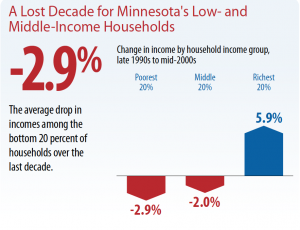If the new DFL-controlled Legislature dares to raise the minimum wage, strengthen the social safety net or make the state tax system more progressive, reporters will surely characterize the moves as political payoffs to DFL constituencies. Mainstream news reporters have fallen into a habit of covering policymaking like it is nothing more than a politically motivated auction of gifts for special interest.
To be sure, those policies help traditional DFL constituencies, and political motives are very much in the mix. But beyond crass vote-buying, there is also a pretty darn good reason to help low- and middle-income Minnesotans.
 Minnesota is increasingly becoming a land of haves and have nots. From the late 1990s to the mid-2000s, the Center on Budget and Policy Priorities notes that poorest Minnesotans have seen their incomes decrease by 3%, the middle quintile has experienced a 2% decline, and the wealthiest have enjoyed an increase of about 6%. Therefore, Minnesota’s income inequality gap has been growing. Continue reading
Minnesota is increasingly becoming a land of haves and have nots. From the late 1990s to the mid-2000s, the Center on Budget and Policy Priorities notes that poorest Minnesotans have seen their incomes decrease by 3%, the middle quintile has experienced a 2% decline, and the wealthiest have enjoyed an increase of about 6%. Therefore, Minnesota’s income inequality gap has been growing. Continue reading
